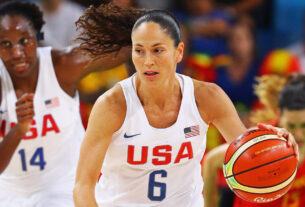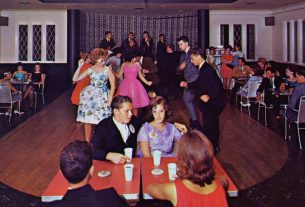WEST HOLLYWOOD, Calif. ((JR)) — When he heard that Hamas had called for a global day of protest last week to accompany its deadly attack on Israel, Alex Edelman’s mind turned, naturally, to jokes.
Riffing on the traditional Hebrew holiday greeting “chag sameach,” the Jewish comedian wondered aloud to a packed room of Hollywood industry members and Jewish leaders, “Do you say ‘Rage Sameach?’”
Moments later, Edelman struck a more somber tone about the violence in Israel, which his brother A.J. Edelman has represented in the Olympics. “For me, Israel is a sort of home,” Edelman said, tearing up on stage.
Edelman — whose one-man Broadway show about his encounter with white supremacists made him a star last year — was speaking at Variety magazine’s star-studded summit on antisemitism and Hollywood. Edelman told the Jewish Telegraphic Agency that he chose to be part of the event because “I wanted to be with other Jews, and without sounding canned, with non-Jewish allies, who are interested in wrestling with a more nuanced understanding of antisemitism.”
Although the summit was planned months before Hamas’ attack on Oct. 7, it was dominated by what is going on in Israel and Gaza. Edelman’s two comments about Israel were indicative of the tenor of the daylong, invite-only event: It flip-flopped between seriousness and humor, as the speakers attempted to process the news while simultaneously sticking to a pre-planned event schedule.
Put on in partnership with several Jewish organizations, the summit featured a series of panel conversations with Jewish A-list stars including Edelman, Julianna Margulies, Tiffany Haddish, Marc Maron, Josh Malina and Josh Peck, plus remarks from leaders of Jewish groups such as the Anti-Defamation League, the American Jewish Committee and the USC Shoah Foundation. (A previously planned keynote address by SAG-AFTRA president Fran Drescher was scrapped due to developments in the actors union’s strike negotiations.)
The event covered a number of topics related to antisemitism and entertainment: representation, social media, comedy, the history of Jews in Hollywood and others. The original event agenda included only one panel about Israel, but much of the day’s conversations revolved around the war.
Several speakers echoed the sentiment that the violence in Israel had only made the summit more important and timely because of the online conversation and wave of antisemitic incidents around the world tied to peoples’ responses to the war. The program began with a prayer for peace and with the message, shared by Variety’s chief production officer Claudia Eller and others throughout the afternoon, that the magazine “stands in solidarity with Israel.”
CNN commentator Van Jones said he had attended because of the current pain of many in the Jewish community.
“People are hurting,” he told (JR). “I know as a Black person, we look to see who understands our pain. This is a group of people who is grieving, and nobody should grieve alone.”
During one particularly poignant moment during the talk that was specifically intended to focus on Israel, Israeli actress Swell Ariel Or shared that seven of her childhood friends had been killed.
Swell Ariel Or, left, and Odeya Rush, right, speak on a panel about Israel and entertainment at the Variety Hollywood & Antisemitism Summit in West Hollywood, California, Oct. 18, 2023. (Araya Doheny/Variety via Getty Images)
Or, the star of Netflix’s “The Beauty Queen of Jerusalem,” moved to the United States two weeks ago, right before Hamas’ attack, and said she feels a degree of guilt that she’s not in her home country.
The panel, titled “Israel and the Entertainment Industry,” focused on the idea that Hollywood ought to create more content that shares the real-life, everyday stories of Israel and Israeli culture. The Tony-winning play “The Band’s Visit,” which was also adapted into a film, was given as an example of such a story.
During an earlier panel, producer Matti Leshem, whose production company made the 2021 HBO film “The Survivor,” commended U.S. President Joe Biden for his administration’s response to the war, eliciting a full round of applause from the audience.
Some panels alluded to other trends that had inspired the summit in the first place — such as the rise in antisemitic incidents in the United States and recent high-profile scandals like the one surrounding Ye, the rapper formerly known as Kanye West.
“We’re very proud to be able to do this,” Variety CEO Michelle Sobrino-Stearns told (JR). She pointed out that her magazine has also published a special section of 28 articles on antisemitism, penned by Jewish influencers, celebrities and others, some of whom participated in the summit.
In the first celebrity conversation of the day, award-winning actor Julianna Margulies said “it is shocking” how few members of her industry have spoken out against antisemitism.
“The last thing I thought in my life is that I would be the one actress speaking up for Jews,” she told Eller during their chat. “But I’m proud to be here and I hope to inspire other people to speak up.”
Margulies shared her personal Jewish story, talked about her efforts to expand Holocaust education in New York City public schools and gave her take on the debates over Jewish representation in Hollywood.
The Golden Globe and Emmy award-winning actor said she “came to my Judaism quite late in life.” She said she is raising her son Jewish and enjoys celebrating Shabbat every week. “It’s about being together,” she said. “And that’s what I love about Judaism – it’s about community.”

Julianna Margulies, left, and Chief Production Officer of Variety Claudia Eller, right, speak onstage during the Variety Hollywood & Antisemitism Summit in West Hollywood, California, Oct. 18, 2023. (Araya Doheny/Variety via Getty Images)
When it comes to the debate on “Jewface” — whether non-Jews should play Jewish characters on screen — Margulies said, “It’s a slippery slope.” She added that while she would never play a character of a different race, she said actors should be allowed to act.
On the other hand, Margulies also advocated for more casual depictions of Jewishness on screen — characters who happen to be Jewish, whether or not that identity is relevant to the plot.
She recalled that the costume department for the Apple TV+ hit “The Morning Show” had given her a cross necklace to wear for her character Laura Peterson. Margulies said she didn’t think much of it at first, since her character’s faith was not prominent in the show. But as she returned for a second season, Margulies said her mentality changed. “What if Laura Peterson was wearing a Star of David, or a chai?” she said, suggesting that subtle Christianity shouldn’t always be the default.
On one panel about comedy, which featured perhaps the most famous speakers of the day, Edelman, Ike Barinholtz, Maron and Haddish discussed the role of comedy as a response to tragedy.
Maron, who has infused Jewishness and jokes about antisemitism into much of his comedy over a decades-long standup and TV career, said his father still warns him to be careful when he’s touring — especially because of how vocally Jewish he is in his stand-up.
Haddish shared her experience discovering her Jewish heritage and noted the importance of recognizing the various different ethnicities Jewish people can represent.
“I thought it was important to be here so that the narrative can be heard that we do care, that we are sticking together, that comedy is important for the soul and can heal,” she told (JR) after the panel.
“I do think Jews are able to find comedy in horrible things, in horrible moments,” said Barinholtz, who has starred in “The Mindy Project” and more recently in “History of The World: Part II.” “And I don’t think we’re there yet with [Israel], I don’t know if we ever will be.”




